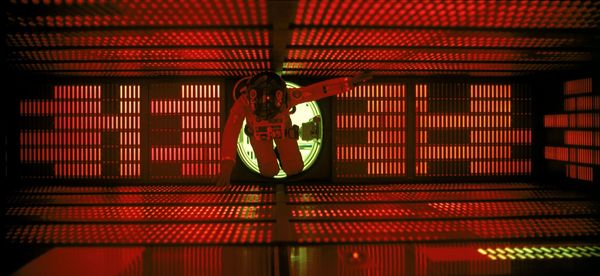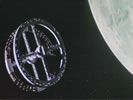Eye For Film >> Movies >> 2001: A Space Odyssey (1968) Film Review
2001: A Space Odyssey
Reviewed by: Nicola Osborne

At the height of the Space Race and a full year before man first landed on the moon, Stanley Kubrick asked Arthur C. Clarke to think years into the future to see how man's long term exploration of space might pan out... and 2001 (based on Clarke's 1948 short "The Sentinel") was born.
When a mission to the moon results in the discovery of a buried black obelisk, the search is on to find out where it has come from. Its origins are clearly not organic and the object is like a more mysterious stonehenge with all the attendant fascination. Who created it? How? Why? So the HAL 9000 (Douglas Rain) - a high tech computer with a wonderfully calm (yet slightly camp) voice and advanced intelligence - is dispatched with a team of astronauts to investigate.

As their mission progresses events take a strange and profound turn or two whilst HAL explores his artificial intelligence and develops his bond with Dr Dave Bowman (Keir Dullea).
Kubrick's careful use of artificial images, convincing space paraphernalia and stunning cinematography have been permanently etched into the minds of generations of film-goers and inspired a host of diverse parodies over the years.
Although - as with all science fiction - there are elements of the film that now look dated (not least the Doris Day style Pan-Am flight attendants in the earliest sequences), most of the film has stood the test of time well. Perhaps this is down to the combined genius of Kubrick and Clarke or perhaps it's just because the appearance of manned space travel has changed so little in the past 33 years.
It may have been aeons prior to computer special effects but somehow the sets and models used to portray the spacecraft and the solar system look as real as anything you might see beamed down from the Hubble telescope today.
Newly digitally remastered, the long wordless opening of 2001 remains one of the most beautiful sequences on film greatly helped by the inspired choreography to classical music (most notably Strauss's Blue Danube Waltz) rather than to a contemporary score. Mercifully this also reinforces the silence of space, something so often forgotten in modern Sci-fi movies.
So it is now the year 2001 and how have things shaped up? Well we're hardly at the stage of taking calm airline flights into space yet... but in the years since those first moon landings we have continued to find evidence in space (most recently the "water on Mars" fiasco) to make us question our origins on Earth.
Whilst we still hold on to that most human curiosity about ourselves and the possibility that we may not be alone, 2001 remains a relevant and thought-provoking film. It is also surely the brightest star in Kubrick's rather patchy - though at times brilliant - directing career.
A true classic that remains fresh and dazzlingly beautiful.
Reviewed on: 30 Mar 2001

















